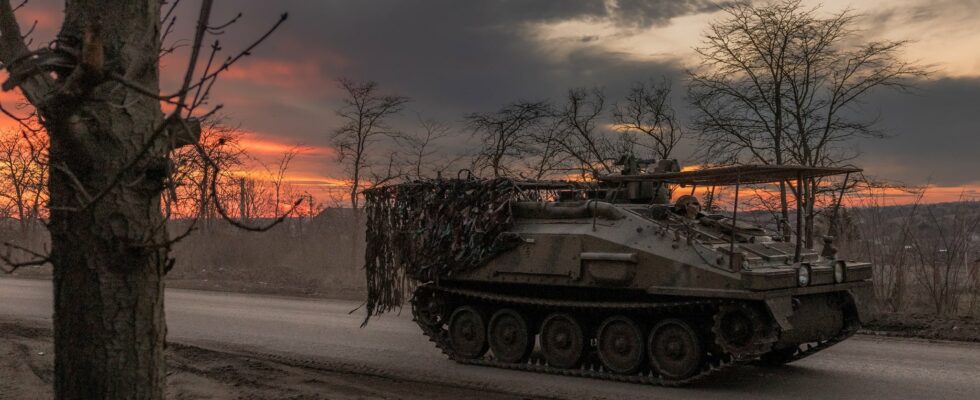Will European countries deploy troops in Ukraine? The sensitive subject comes up regularly in the debates. He surely fueled discussions in Paris this Monday afternoon, during an informal meeting on Ukraine and security in Europe chaired by Emmanuel Macron. A dozen leaders from European countries, the EU and the NATO chief are present at the Elysée for this emergency meeting while Donald Trump intends to negotiate directly with Vladimir Putin Peace in Ukraine.
The day before, Keir Starmer launched hostilities on the deployment of troops. The British Prime Minister said he was ready to send soldiers to Ukraine if necessary to ensure the security of Great Britain and Europe. The United Kingdom plays a leading role by supporting kyiv in the war against Russia, which “also means that we are ready and willing to contribute to security guarantees for Ukraine by sending our own troops on the ground if necessary, “wrote Keir Starmer on Sunday in everyday life Daily Telegraph.
“I’m not saying that lightly,” added Keir Starmer. The Prime Minister said he was measuring “the responsibility implied by potentially in danger of” the men and women of the British army. But “helping to guarantee the security of Ukraine is helping to guarantee the security of our continent and the security of the country,” he said.
“Premature” discussions for Berlin
London seems to be isolated for the moment on this issue. Polish Prime Minister Donald Tusk, a strong support from kyiv, assured this Monday before his departure for Paris that Poland would not send soldiers in Ukraine. Germany said this Monday judging “prematurely” on Monday discussions on the sending of possible troops in Ukraine. It is also a question of “preventing war again in a few years”, underlines a German government source with AFP, indicating that the maintenance of lasting peace would be a “transatlantic task”. “We will not participate in scenarios in which European and American security would dissociate themselves, for example if European soldiers were deployed without total commitment from the United States,” said the same source.
“We have expressed ourselves several times that we should first wait to see if and how peace, as we hope, is established in Ukraine,” said Christiane Hoffmann, a spokesperson for the government German at a regular press conference. “Then we can discuss the conditions and the way it can be organized,” she added. But Berlin therefore judges the discussions “at this stage still premature”.
Like Germany, Spain estimated this Monday that it was “too early for the moment” to discuss the sending of its troops to Ukraine. “There is currently no peace” and the objective of diplomacy “must be to achieve it as soon as possible,” Foreign Affairs Minister José Manuel Albares said at a press conference. “When we have peace, then we will have to see what conditions it requires. When we talk about the deployment of armed forces, we must see what their mission is, which can constitute it, under which flag, with what mandate”. -It added at the end of a meeting with his Brazilian counterpart Mauro Vieira.
In Norway, Prime Minister Jonas Gahr Støre also judged that “the time had not come” to discuss the sending of Norwegian soldiers to Ukraine. “Now is not the time to draw conclusions on how a security guarantee should be formulated and the type of contribution to make,” he insisted on the NRK radio microphone.
“We must first negotiate a fair and lasting peace”
For its part, Sweden “does not exclude” the sending of peacekeeping soldiers to Ukraine, its Minister of Foreign Affairs Maria Malmer Stenergard said on Monday. But Sweden also wants to prioritize peace talks. “We must first negotiate now a just and lasting peace that respects international law […] When we have this installed peace, it will have to be maintained and for that, our government does not exclude anything, “said Maria Malmer Stenergard on Sverges Radio public radio.
The meeting organized this Monday in Paris intervenes at a particularly delicate moment when Donald Trump’s initiatives, who resumed language with Russian President Vladimir Putin, worry the Europeans. The American president recently announced that he would meet his Russian counterpart in Saudi Arabia to initiate negotiations on Ukraine, where the war triggered by the Russian invasion will enter its fourth year on February 24.
Just before the start of these interviews, this Monday, Emmanuel Macron spoke on the phone with Donald Trump. This meeting is held the day after the Security Conference in Munich, where the very offensive speech by the American vice-president JD Vance caused a shock to European countries. They fear being excluded from negotiations on Ukraine.
